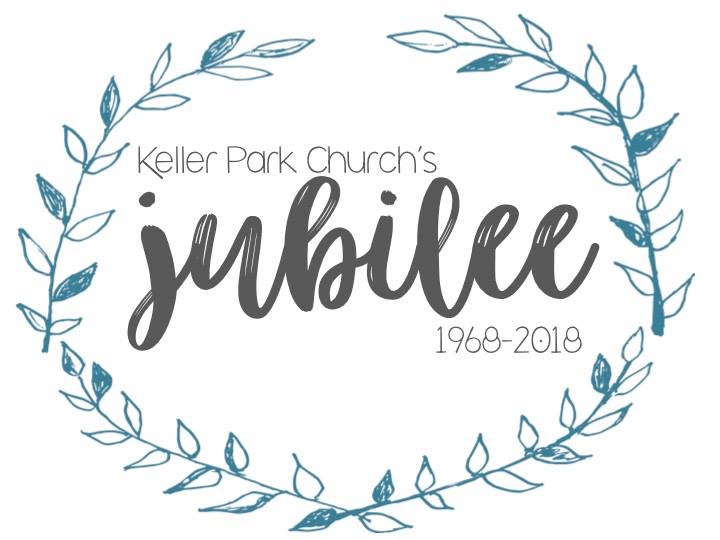Last year the church where I serve as teaching pastor, Keller Park Church (South Bend, Indiana), celebrated its 50th anniversary—or our very own year of Jubilee. To celebrate this occasion, I preached a series on the Jubilee theme as found in the Gospel of Luke (with allusions to Isaiah and Leviticus). Below is the third sermon of the series. (While you’re here, check out the first and second sermons, Revolution and Release.)

When I was a kid, we observed the Sunday Sabbath quite religiously—in both the figurative and literal meaning.
On Saturday afternoons, my mom would make homemade cinnamon rolls, and on Saturday evenings she would prep food for Sunday dinner. (Sundays were the one day of the week where “dinner” meant “lunch.”)
On Sunday morning, we would wake up, reheat the cinnamon rolls in the microwave and eat them with hot chocolate. My mom would put the chicken or roast in the oven, and we would head to church.
There my parents would sing in the choir for all three morning services. Then we’d head home and have our big Sunday dinner.
Afterward, we would be so stuffed that we would collapse in the family room in front of football or golf on TV.
After our food-induced naps, we would get around and head back to church for the Sunday evening service.
When we got home from church in the evening we would make what we called “Sunday night spaghetti,” which was just a jar of Ragu sauce mixed into spaghetti noodles.
That was our Sunday routine for years, with minor variations—like an occasional frozen pizza in lieu of spaghetti.
We didn’t mow the lawn on Sunday. We didn’t play scheduled sports on Sunday. We didn’t go shopping on Sunday. We almost never missed church—morning or evening. And, perhaps most importantly, we guarded our Sunday afternoon family dinner fiercely.
This was the extent of our understanding of the Sabbath. It was a day of church, food, and naps. We weren’t necessarily strict or legalistic about it. It was just our routine, our way of life. There were certain things you just did or didn’t do on the Sabbath.
So when I would read or hear Gospel stories like this one from Luke 6, I would picture Jesus as a rebellious Sabbath-breaker. If it was OK for Jesus to break the Sabbath, then the Sabbath must be part of the Old Testament law that we no longer need to observe. Which meant that it was unreasonable for my parents not to let me go to the after-prom trip to Cedar Point since it was on a Sunday. My parents were the legalistic Pharisees, and I was the liberated disciple.
But is that really what’s going on in these stories? Is Jesus rendering Sabbath observance obsolete? Or is something else going on here?
When we read these stories in light of Jesus’s Jubilee proclamation in Luke 4, I think a different meaning emerges. Recall that in Luke 4, Jesus reads from the scroll of Isaiah, which proclaims “the year of the Lord’s favor”—or the year of Jubilee. He then says that this prophecy is fulfilled in their hearing that day.
Then, just two chapters later, we find Jesus and his disciples strolling through the grainfields, picking heads of grain, and eating the kernels. And all of this is apparently happening right in front of a group of Pharisees since they’re right there to accuse them of doing what’s unlawful on the Sabbath.
Are Jesus and the disciples simply flaunting their ability to break the Sabbath laws in front of the Pharisees? Are they trying to prove how legalistic the Pharisees are? Are they perhaps trying to pick a fight?
I would like to suggest that it’s none of the above.
Instead of breaking the Sabbath, they are actually observing the Jubilee.
Recall how the Jubilee is rooted in Leviticus 25. There we see Yahweh’s instructions to Moses for how to observe the Sabbath year and the super-Sabbath year, the year of Jubilee.
Yahweh tells Moses in Leviticus 25:4–7 (NIV),
In the seventh year the land is to have a sabbath of rest, a sabbath to the Lord. Do not sow your fields or prune your vineyards. do not reap what grows of itself or harvest the grapes of your untended vines. the land is to have a year of rest. Whatever the land yields during the sabbath year will be food for you—for yourself, your manservant and maidservant, and the hired worker and temporary resident who live among you, as well as for your livestock and the wild animals in your land. Whatever the land produces may be eaten.
Then in verse 11, Yahweh tells Moses, “The fiftieth year shall be a jubilee for you; do not sow and do not reap what grows of itself or harvest the untended vines. For it is a jubilee and is to be holy for you; eat only what is taken directly from the fields.”
So when Jesus and his disciples eat directly from the fields, they are not minimizing the Sabbath; they are maximizing it. They are celebrating the super-sabbath, the Jubilee, the year of the Lord’s favor.
And so Jesus tells the Pharisees not that he and his disciples reject the Sabbath but rather than he is “Lord of the Sabbath.” It’s the year of the Lord’s favor, and Jesus is Lord!
This story is not as a contest between Sabbath-observers and Sabbath-breakers but a contest between two understandings of the Sabbath. The Pharisees viewed the Sabbath as a day of individual rest and worship. Jesus was calling them to remember that the Sabbath was also a time to let the land rest and for the people to freely enjoy the food that it produced—just as David and his companions did when they were in a bind.
Once we see that the contest is between two rival visions of the Sabbath, we can read the next episode in a new light as well. Luke tells us that on another Sabbath, Jesus sees a man with a shriveled hand. And so he has the man stand, and he asks the Pharisees and teachers of the law, “Which is lawful on the Sabbath: to do good or to do evil, to save life or to destroy it?” (Luke 6:9).
Notice that his question is not, Should I break the Sabbath to help this man? It is instead, Is not doing good and saving life the lawful observance of the Sabbath?
Jesus is once again channeling the prophet Isaiah’s understanding of the Sabbath. In Isaiah 58, YHWH—through the prophet Isaiah—chastises Israel for failing to properly observe the Sabbath. YHWH asks in verse 5:
Is this the kind of fast I have chosen,
only a day for people to humble themselves?
Is it only for bowing one’s head like a reed
and for lying in sackcloth and ashes?
Is that what you call a fast,
a day acceptable to the Lord?
Then in verses 6 and 7, he responds with a series of rhetorical questions:
Is not this the kind of fasting I have chosen:
to loose the chains of injustice
and untie the cords of the yoke,
to set the oppressed free
and break every yoke?
Is it not to share your food with the hungry
and to provide the poor wanderer with shelter—
when you see the naked, to clothe them,
and not to turn away from your own flesh and blood?
People who are oppressed or burdened with a heavy yoke are not free to rest. People who have no food to eat or shelter over the heads or clothes to wear are not free to rest.
And so, in verses 13 and 14, Yahweh makes the connection with Sabbath observance explicit:
“If you keep your feet from breaking the Sabbath
and from doing as you please on my holy day,
if you call the Sabbath a delight
and the Lord’s holy day honorable,
and if you honor it by not going your own way
and not doing as you please or speaking idle words,
then you will find your joy in the Lord,
and I will cause you to ride in triumph on the heights of the land
and to feast on the inheritance of your father Jacob.”
For the mouth of the Lord has spoken.
Yahweh tells his people that the Sabbath is not about “doing as you please” or “going your own way,” but it’s about helping others out of their bondage and suffering so that they, too, can find joy in the Lord.
And so when Jesus tells the man, “Stretch out your hand” (Luke 6:10), and restores the man’s hand, he once again is not breaking the Sabbath but fulfilling it.












